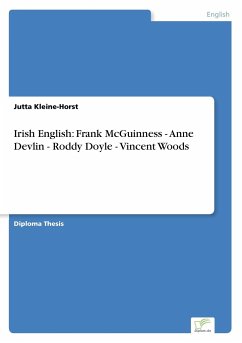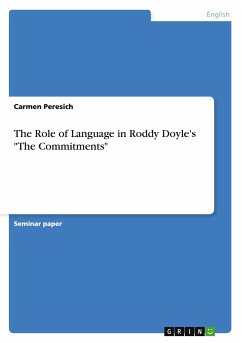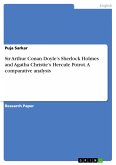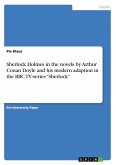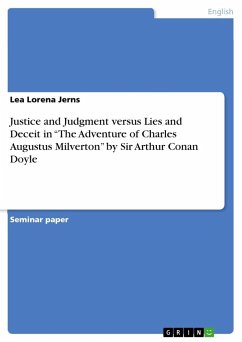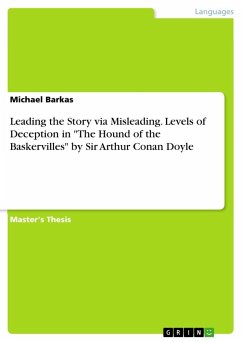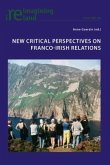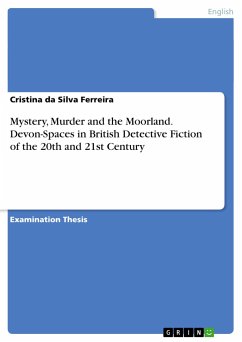Diploma Thesis from the year 2004 in the subject English Language and Literature Studies - Literature, grade: 1,0, Johannes Gutenberg University Mainz (Angewandte Sprach- und Kulturwissenschaft, Anglistik, Amerikanistik und Anglophonie), language: English, abstract: Inhaltsangabe:Abstract:
Irish English (hereafter abbreviated as IE) has been the subject of many previous studies, dealing primarily with history, grammar, pronunciation and lexicon. Many works have also been published about the English language used in works of famous Anglo-Irish authors such as Swift, Synge or Joyce. However, little research exists on the English language used in works by contemporary Irish authors. The purpose of this paper is to give an idea of what modern written IE is like.
In this paper four plays by contemporary Irish authors (all born between 1950 and 1960) will be analysed with regards to pronunciation, grammar, lexicon and manners of speech. These plays are:
- The Factory Girls byFrank McGuinness.
- After Easter by Anne Devlin.
- Brownbread by Roddy Doyle.
- At The Black Pig s Dyke by Vincent Woods.
As will be discussed later on, IE is not a common dialect, but regionally different, especially between the northern and the southern part of the island.
In order to point out some dialect variation, the plays were selected according to their settings, which were County Donegal, Belfast, Dublin and County Leitrim.
This paper will be divided into two parts. In the first part, I would like to give a theoretical overview of the various aspects of IE, such as grammar, pronunciation, lexicon and manners of speech, and how they differ from Standard English (henceforth abbreviated as SE).
I will commence by providing a historical overview on how and when the English language came to Ireland, which is essential for understanding the further development of the different dialects and accents. This introductory overview is followed by IE pronunciation and grammar in comparison to RP and SE respectively. Subsequently, the lexicon of IE and certain manners of speech, such as exaggeration, will be considered.
The second part will comprise the analyses of the four plays, which were carried out on the basis of those features of IE outlined in the theoretical part. The analyses will provide a short summary of the respective play, and present relevant examples from the plays.
Evidently, there are more typically Irish features in the text corpus, however these are not investigated here. The second part will conclude with a comparison of the findings of the four plays.
Inhaltsverzeichnis:Table of Contents:
1.Introduction3
Part I.5
2.The advance of the English language in Ireland across the centuries5
3.Linguistic characteristics of Irish English17
4.Lexicon42
5.Manners of speech43
Part II.45
1.The Factory Girls45
2.After Easter57
3.Brownbread69
4.At The Black Pig s Dyke84
5.Conclusion99
6.Works consulted101
Textprobe:Text Sample:
Chapter IV, Lexicon: With the influence of Irish as well as old English and Scots dialects it seems only natural that a certain number of distinctive vocabulary should have come to pass. The great number of these words and phrases can be divided into two categories: words of Irish origin, and words of English (including Scots) origin.1 These two categories can then be further subdivided.
Words of Irish origin are mostly loanwords of which the meaning is carried over into Irish English. Quite often, the spelling of these Irish words has been anglicised, as in smithereens from smidiríní, or macushla from mo chuisle . In the Republic of Ireland, Irish words are generally used for political institutions, such as Taoiseach (the Prime Minister), Dáil (the parliament), or political parties, such as Fianna Fáil, Fine...
Hinweis: Dieser Artikel kann nur an eine deutsche Lieferadresse ausgeliefert werden.
Irish English (hereafter abbreviated as IE) has been the subject of many previous studies, dealing primarily with history, grammar, pronunciation and lexicon. Many works have also been published about the English language used in works of famous Anglo-Irish authors such as Swift, Synge or Joyce. However, little research exists on the English language used in works by contemporary Irish authors. The purpose of this paper is to give an idea of what modern written IE is like.
In this paper four plays by contemporary Irish authors (all born between 1950 and 1960) will be analysed with regards to pronunciation, grammar, lexicon and manners of speech. These plays are:
- The Factory Girls byFrank McGuinness.
- After Easter by Anne Devlin.
- Brownbread by Roddy Doyle.
- At The Black Pig s Dyke by Vincent Woods.
As will be discussed later on, IE is not a common dialect, but regionally different, especially between the northern and the southern part of the island.
In order to point out some dialect variation, the plays were selected according to their settings, which were County Donegal, Belfast, Dublin and County Leitrim.
This paper will be divided into two parts. In the first part, I would like to give a theoretical overview of the various aspects of IE, such as grammar, pronunciation, lexicon and manners of speech, and how they differ from Standard English (henceforth abbreviated as SE).
I will commence by providing a historical overview on how and when the English language came to Ireland, which is essential for understanding the further development of the different dialects and accents. This introductory overview is followed by IE pronunciation and grammar in comparison to RP and SE respectively. Subsequently, the lexicon of IE and certain manners of speech, such as exaggeration, will be considered.
The second part will comprise the analyses of the four plays, which were carried out on the basis of those features of IE outlined in the theoretical part. The analyses will provide a short summary of the respective play, and present relevant examples from the plays.
Evidently, there are more typically Irish features in the text corpus, however these are not investigated here. The second part will conclude with a comparison of the findings of the four plays.
Inhaltsverzeichnis:Table of Contents:
1.Introduction3
Part I.5
2.The advance of the English language in Ireland across the centuries5
3.Linguistic characteristics of Irish English17
4.Lexicon42
5.Manners of speech43
Part II.45
1.The Factory Girls45
2.After Easter57
3.Brownbread69
4.At The Black Pig s Dyke84
5.Conclusion99
6.Works consulted101
Textprobe:Text Sample:
Chapter IV, Lexicon: With the influence of Irish as well as old English and Scots dialects it seems only natural that a certain number of distinctive vocabulary should have come to pass. The great number of these words and phrases can be divided into two categories: words of Irish origin, and words of English (including Scots) origin.1 These two categories can then be further subdivided.
Words of Irish origin are mostly loanwords of which the meaning is carried over into Irish English. Quite often, the spelling of these Irish words has been anglicised, as in smithereens from smidiríní, or macushla from mo chuisle . In the Republic of Ireland, Irish words are generally used for political institutions, such as Taoiseach (the Prime Minister), Dáil (the parliament), or political parties, such as Fianna Fáil, Fine...
Hinweis: Dieser Artikel kann nur an eine deutsche Lieferadresse ausgeliefert werden.

